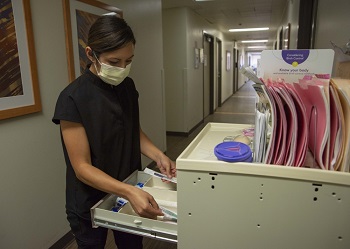 Angelica Lopez, a medical assistant assigned to Naval Medical Center San Diego’s OB-GYN, prepares for a contraception procedure at the hospital Sept. 14. (Photo by Navy Seaman Luke Cunningham, Naval Medical Center San Diego.)
Angelica Lopez, a medical assistant assigned to Naval Medical Center San Diego’s OB-GYN, prepares for a contraception procedure at the hospital Sept. 14. (Photo by Navy Seaman Luke Cunningham, Naval Medical Center San Diego.)
Sanchez said sexual health is highly relevant to the military because service members tend to be young – the most likely to be affected by sexually-transmitted infections. However, STIs are not unique to a specific age group or gender.
“STIs are increasing in older populations, when risk of pregnancy is gone, but the knowledge of safer sexual practices may not be as well known,” said Army Lt. Col. (Dr.) Erin Keyser, the Army representative for DHA’s Woman and Infant Clinical Community (WICC) at Brooke Army Medical Center, in San Antonio. “Education and screening related to STIs should occur across all the years of sexual activity.”
STIs are important to identify and treat because they can impact service members’ health and readiness, as well as their ability to perform their duties. DHA’s clinical communities work together to provide outreach, information, and educational material about common health concerns – such as STIs and overall sexual health – to ensure everyone gets the same message.
For example, the Military Specific Clinical Community, the Primary Care Clinical Community, and WICC work in partnership to share leading practices and standardized practice models on health issues common to all service members, such as sexual health. PCCC – with a mission to support routine and required screening of health care effective measures – identifies and treats STIs, including HIV, hepatitis C, and HPV, explained Keyser.
WICC leverages technology to provide information resources to beneficiaries more broadly. The Deployment Readiness Education for Service Women mobile application and handbook, anticipated for release in the fall, will make DRES content applicable to all services on Android and Apple platforms.
“The DRES app is designed to enhance the knowledge of women’s health and provide education on topics throughout the female lifespan, to include sexual health and safe sex practices for all types of couples,” said Keyser.
WICC has also partnered with the DHA Connected Health Branch to create a series of podcasts on women’s health issues to be released in the spring.
“The podcasts target providers taking care of active-duty female service members and female beneficiaries and focus on clinical and deployment readiness, including information on the HPV vaccine, female deployment, breastfeeding, postpartum depression, and infertility, among others,” said Keyser.
WICC’s focus is mainly for female beneficiaries, with an emphasis on empowering women through knowledge. “When we teach women and empower them about sexual health, women can then share and discuss this knowledge with all those around them including their partners, friends, colleagues, and communities,” said Air Force Lt. Col. (Dr.) Larissa Weir, Air Force representative for WICC at BAMC.
“Sexual health is an individual responsibility and a shared responsibility within a couple. Empowering both partners expands knowledge and healthy behaviors,” added Weir.
Community-based care
To make this knowledge available to all MHS beneficiaries, there are over 30 DOD walk-in contraception clinics across MHS. These provide STI screening and treatment as well as allow women immediate access to a full spectrum of contraception.
Additionally, many of the military treatment facilities provide local sexual health awareness and services. At Naval Medical Center Camp Lejeune, in Camp Lejeune, North Carolina, the Community Health Clinic (CHC) provides STI testing, treatment, and prevention services, including medication such as HIV Pre-Exposure Prophylaxis for active-duty service members at moderate to high risk, said Navy Petty Officer 2nd Class Kameron Jacobs, hospital corpsman at the clinic who leads the command’s Sexual Health Awareness and Responsibility Program.